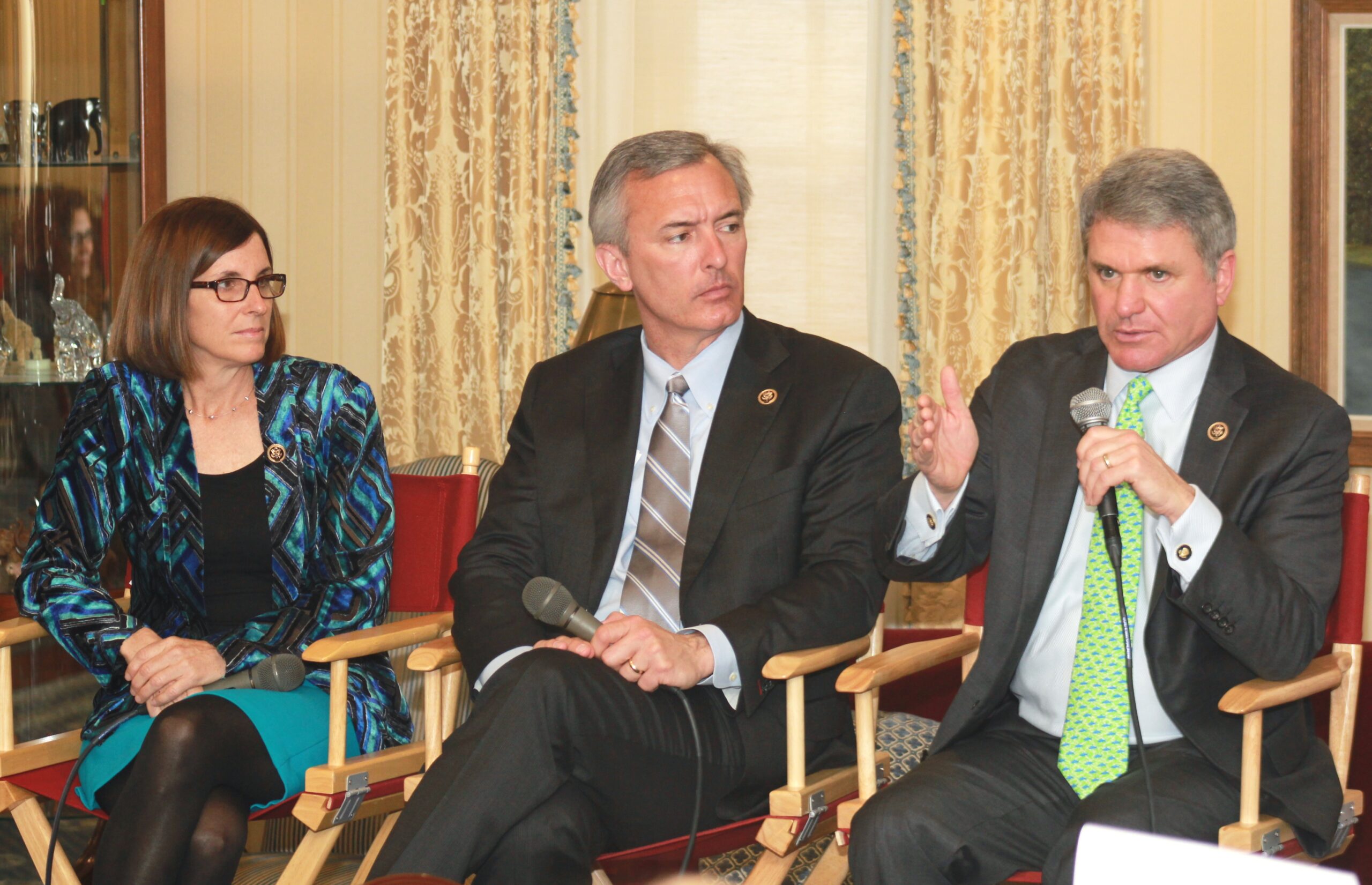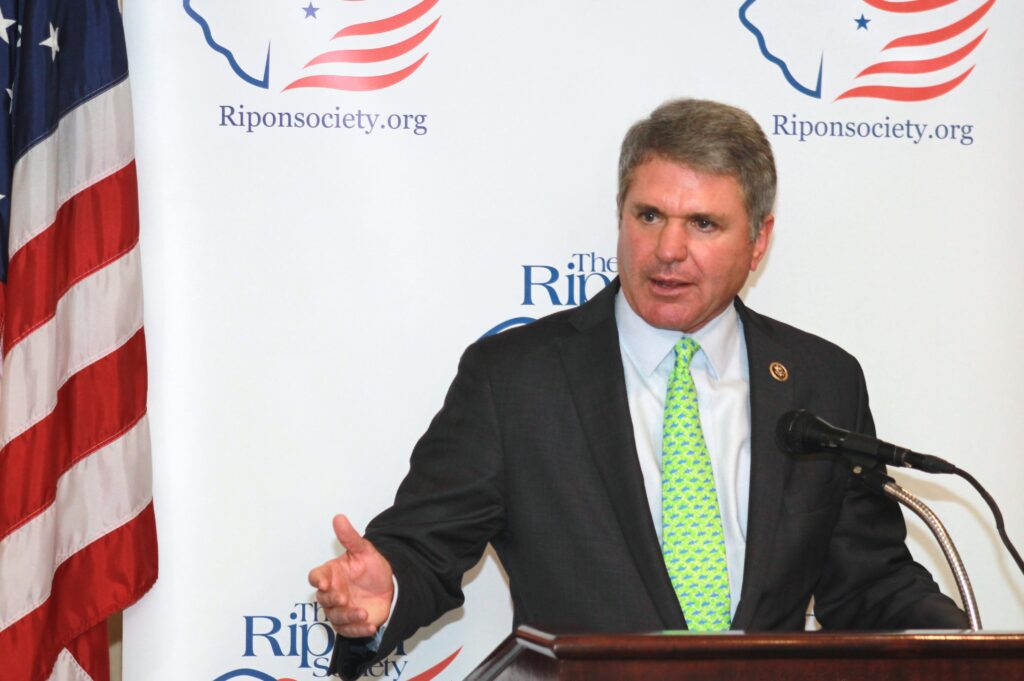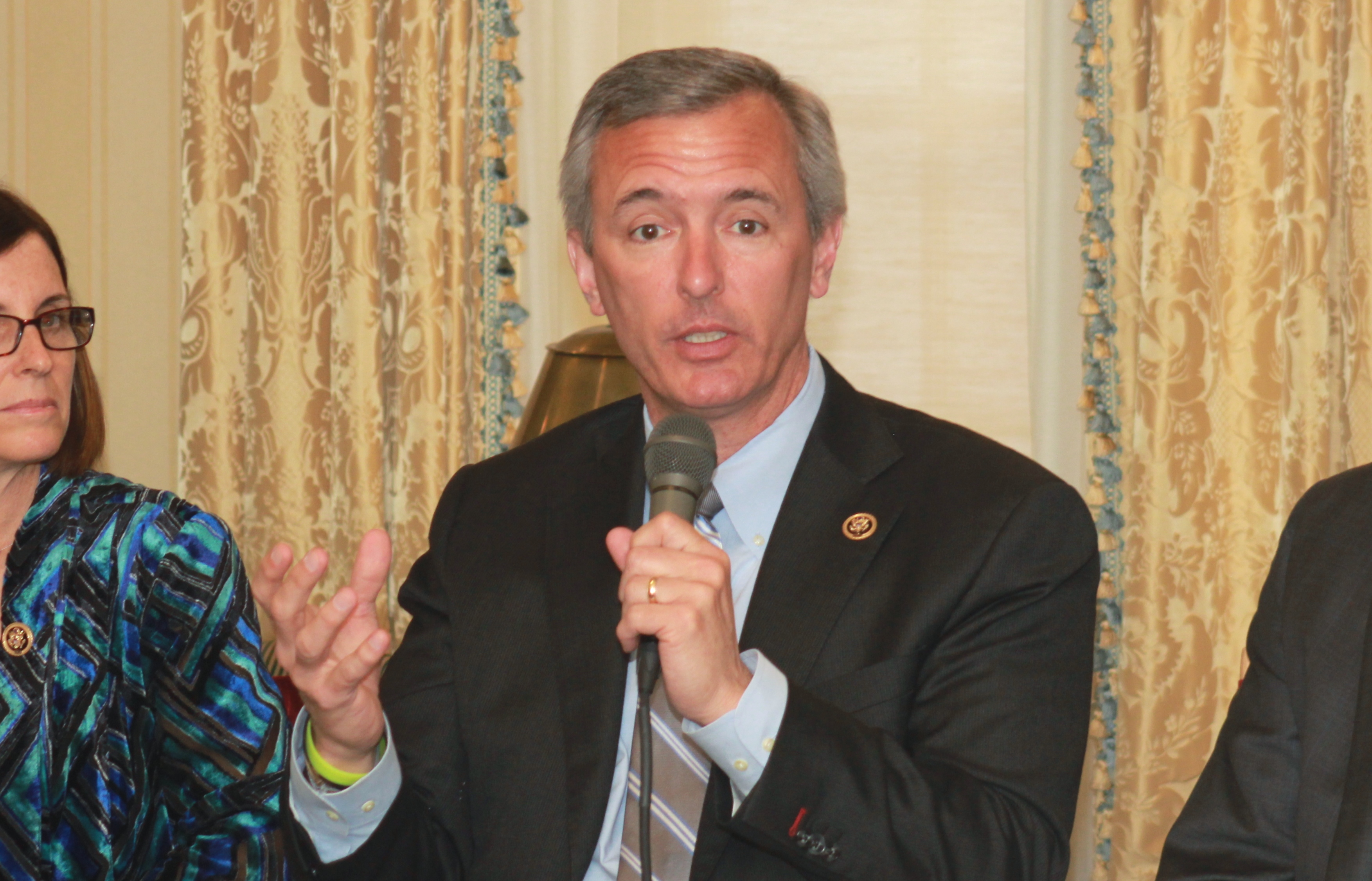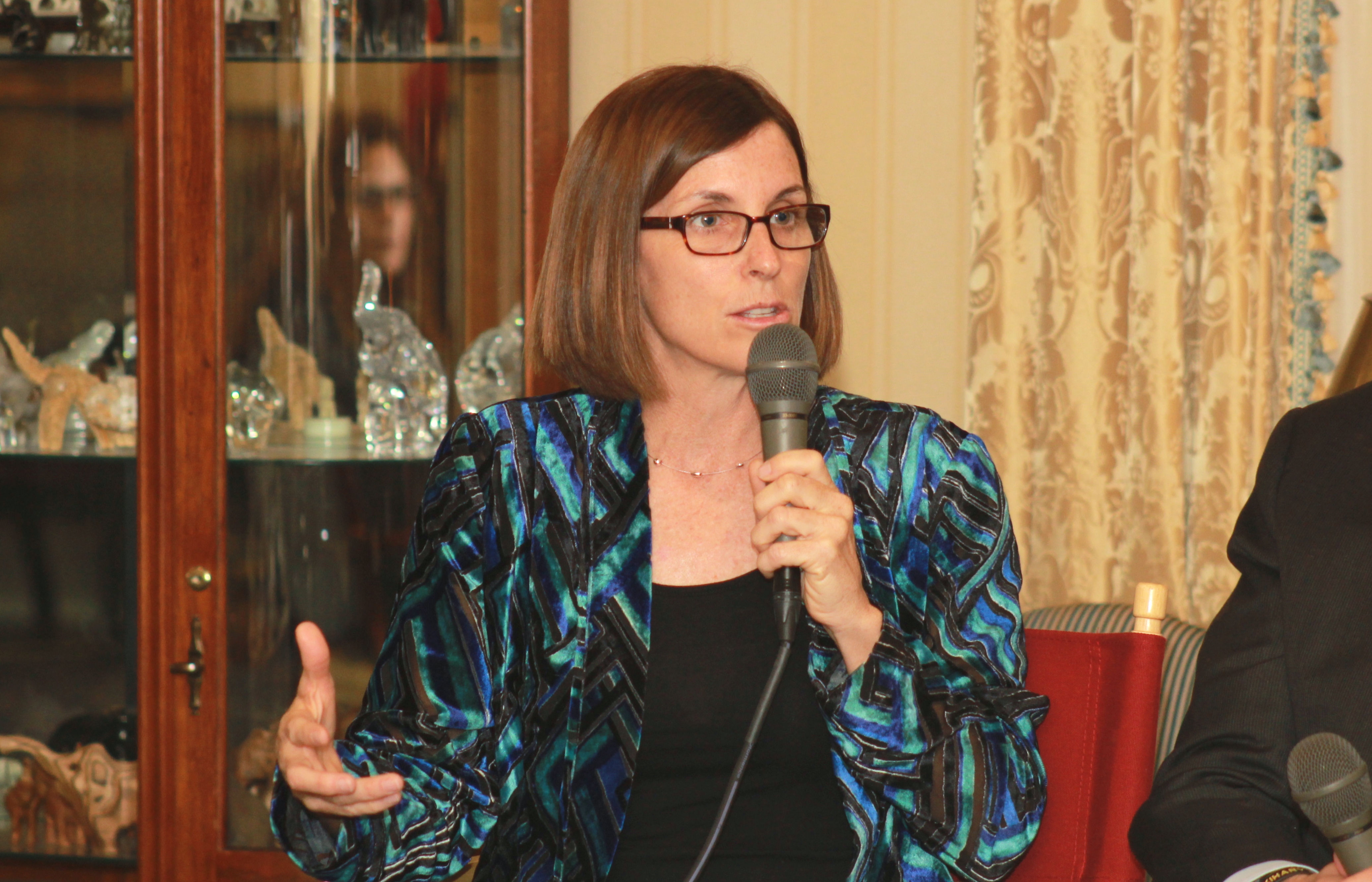 Chairman McCaul, Reps. Katko & McSally Discuss Work of Homeland Security Committee and the Challenges Facing America Abroad
Chairman McCaul, Reps. Katko & McSally Discuss Work of Homeland Security Committee and the Challenges Facing America Abroad
WASHINGTON, DC – Homeland Security Committee Chairman Michael McCaul (TX-10) appeared before a breakfast meeting of The Ripon Society yesterday morning, delivering remarks in which he not only discussed his panel’s agenda for the coming year, but stated that the threat America is facing from terrorists around the world “is growing, not diminishing.”
McCaul was joined at the meeting by two of his Subcommittee Chairs: U.S. Rep. John Katko (NY-24), who serves as Chair of the Transportation Security Subcommittee; and, U.S. Rep. Martha McSally (AZ-2), who serves as Chair of the Subcommittee on Emergency Preparedness, Response, and Communications. The three leaders pointed to several key areas where the Committee is working to strengthen America’s security, including a bipartisan measure the panel unanimously approved earlier this week to better prepare us for cyber attacks online.

“Cyber is an area where the probability of attack is high and the potential for severe damage is very high as well,” McCaul stated. “We have great offensive capabilities to shut things down; so does Russia, and so does China. Iran is also demonstrating great capability. Iran shut down 30,000 hard drives in Saudi Aramco, and is hitting our financial sector on a daily basis. What this bill does is build on the success that we had in authorizing the Department of Homeland Security cyber security operations that President Bush put in place. It’s working, but they don’t have the liability protections needed to have full participation by the private sector.”
According to McCaul, the legislation approved by his Committee provides liability protection to any company that voluntarily shares information about malicious codes and other cyber threats. “In turn,” he added, “we share information with them. Most importantly, because about 85% of this threat information resides in the private sector, we allow them to share private-to-private and give them liability protection. We think this will be transformational in terms of defending our networks in the private sector and also in the federal government, which I would argue is very vulnerable.”
McCaul was elected to Congress in November 2004 and has served as Chairman of the Homeland Security Committee since January 2013. In his remarks, he also touched on another serious threat facing the U.S. that is rapidly growing – the threat posed by the Islamic State of Iraq and Syria.
“I was briefed on ISIS probably a year and a half ago before it hit the news,” the Texas lawmaker said, “It has escalated over that time. It was really the product of a couple errors in judgment. There was sort of a false narrative that Al Qaeda was on the run. I was at Fort Hood last week awarding Purple Hearts to the 12 soldiers who were killed by Major Hasan, who was talking to Anwar al-Awlaki in Yemen, asking for permission to do what he did. That was downplayed as workplace violence. Benghazi was blamed on a video. Al Qaeda was on the run. After the killing of bin Laden, it was supposed to be over because that was the narrative. But it’s not, unfortunately. I wish it was, but it’s not over.
“It wasn’t until the beheadings occurred that the American people woke up to the fact that this narrative is false and the threat is still real. It’s not just in Syria and Iraq. This radical Islamist movement — and you have to call it that because that’s what it is – is spreading like wildfire across northern Africa and the Middle East. We pulled out of our embassy in Yemen and pulled out of Libya. Where there’s a power vacuum, terrorists prey — that’s where they breed. The threat is growing, not diminishing. And as it grows overseas, so too does the threat to the homeland.”
Katko echoed Chairman McCaul’s comments, and pointed to another area where U.S. security can – and is being — improved.

“It became apparent when I was getting ready to work on the Committee that airports across the nation have gigantic security gaps,” he stated. “The prime fear is that one of these tens of thousands of workers at the airports who is disgruntled about something could do something very bad. I realized that none of them were getting screened when they go into work every day. They could access secure areas of the airport even on their off days, and the screening process is lax at best.
“Atlanta, for example, had 64 different entry points for employees, and they weren’t getting screened. That’s pretty scary. It all came to light because a fellow from Atlanta got caught carrying a backpack with 16 loaded guns getting off an airplane in New York, two of which were automatic weapons and all of them loaded. He said that was the tenth trip he took doing that. We found out that a low level employee in Atlanta would carry them through a secure area, give him the backpack, and the guy would get on the plane. That’s how the whole thing happened.
“So I said, ‘Let’s call a subcommittee hearing and investigate it.’ I had representatives from the airlines and the airport associations. I thought they would say, ‘No, we don’t need any changes.’ And this is what I learned — simply by identifying the right issue and calling a hearing on it, we made a gigantic change in the way security is done nationwide at airports, because they came not to fight us, but with plans presenting what they wanted to change.
“It was a very valuable lesson to me — that if you do your homework and your staff does their homework, you can really bring about change. You have to identify the right issues – it can’t be fluff. But when you identify the right issues, you can bring about change simply by having a hearing. And we’re going to do that. We’re doing everything we can to make this country as safe as it possibly can be.”
McSally concurred, and touched on her own experience as a 26-year combat veteran in the U.S. Air Force, where, she explained, she also learned a valuable lesson – about missed opportunities and the importance of making sure the policy is right.

“As a Colonel, I was running our counter terrorism operations in Africa,” she revealed. “I saw up close how flawed some of our policies had been and how we watched these al-Qaeda affiliates and Islamic extremists grow and metastasize all over the world. We watched Al-Shabaab, AQIM, West Africa, Boko Haram, take advantage of ungoverned spaces. AQIM was kidnapping westerners in order to build up their coffers so they could continue to buy the weapons and arms that they did once Libya fell into chaos.
“We watched thousands of terrorists being trained in terrorist camps by Al-Shabaab and we repeatedly went up the chain of command and asked, ‘Please, we’ve got to do something about this.’ These guys are going to go harm our interests in the region. They want to build the caliphate, grow it, and take down the West. We would tee up potential operations, and they just repeatedly would say, ‘No, it’s not in our national interest. It’s not our problem. We don’t care about it. This is a regional issue.’
“We now see what’s gone on with the students in Kenya and the mall. This is Al-Shabaab. And I’m telling you, in 2008, 2010, we watched these guys. They’re likely some of the graduates from these camps that we knew about and let go because we failed to take military action. And I agree this is a generational threat and we’ve got to counter the ideology. But we’ve got to kill a lot of them, too.”
To view the remarks of Chairman McCaul, Rep. Katko, and Rep. McSally before The Ripon Society’s breakfast discussion yesterday morning, please click on the link below:
The Ripon Society is a public policy organization that was founded in 1962 and takes its name from the town where the Republican Party was born in 1854 – Ripon, Wisconsin. One of the main goals of The Ripon Society is to promote the ideas and principles that have made America great and contributed to the GOP’s success. These ideas include keeping our nation secure, keeping taxes low and having a federal government that is smaller, smarter and more accountable to the people.



